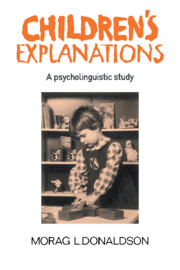Book contents
- Frontmatter
- Contents
- List of illustrations
- List of tables
- Acknowledgements
- 1 Introduction
- 2 The development of the causal connectives and of causality: some previous studies
- 3 Elicited production studies
- 4 The empirical mode
- 5 The intentional mode
- 6 The deductive mode
- 7 General discussion
- Appendices
- 1 Details of procedures for elicited production experiments
- 2 Sequences and items for Experiment 4
- 3 Stories and items used in Experiment 5
- 4 Materials used in Experiment 6 (Deductive/Empirical)
- 5 Acceptability judgement questionnaire based on Experiment 6
- 6 Materials used in Experiment 7 (Deductive Marking)
- Notes
- References
- Index
3 - Elicited production studies
Published online by Cambridge University Press: 21 September 2009
- Frontmatter
- Contents
- List of illustrations
- List of tables
- Acknowledgements
- 1 Introduction
- 2 The development of the causal connectives and of causality: some previous studies
- 3 Elicited production studies
- 4 The empirical mode
- 5 The intentional mode
- 6 The deductive mode
- 7 General discussion
- Appendices
- 1 Details of procedures for elicited production experiments
- 2 Sequences and items for Experiment 4
- 3 Stories and items used in Experiment 5
- 4 Materials used in Experiment 6 (Deductive/Empirical)
- 5 Acceptability judgement questionnaire based on Experiment 6
- 6 Materials used in Experiment 7 (Deductive Marking)
- Notes
- References
- Index
Summary
Introduction
Most of the previous studies involving causal connectives can be criticised on the grounds that they may be imposing demands on the children which are extraneous to the demands faced when comprehending or producing causal connectives in normal discourse. Two notable exceptions to this are the studies by Hood (1977) and by McCabe and Peterson (1985). In these naturalistic studies of children's language production, cause–effect inversions were found to be extremely rare even for the youngest children (2- to 3-year-olds). On the other hand, both studies found that most of the children's uses of the causal connectives involved psychological relations rather than physical or logical relations. This led the authors to propose that one possible explanation for the discrepancy between their results and those of most of the other studies (which suggest that children do not understand the causal connectives until the age of about 7 or 8) would be that the ability to use and understand causal connectives appropriately is initially restricted to expressions with psychological content. In production studies, children can choose to talk about psychological content and will therefore appear competent in their use of because and so. Comprehension studies, on the other hand, typically include physical and/or logical content in addition to psychological content, so they will tend to reveal any limitations in children's knowledge of the connectives' meaning. Thus, the work of Hood and of McCabe and Peterson suggests an interesting hypothesis as to how the discrepant results might be explained.
- Type
- Chapter
- Information
- Children's ExplanationsA Psycholinguistic Study, pp. 43 - 59Publisher: Cambridge University PressPrint publication year: 1986



